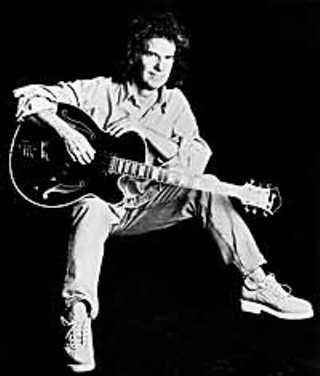Trio 2000
Pat Metheny Trio Blows Into Austin
By Jay Trachtenberg, Fri., Oct. 6, 2000

Guitarist Pat Metheny is quick to point out that he's played Austin many times over the years. Even so, the seminal jazz guitarist's local appearances this weekend, Friday and Sunday at the One World Theatre, are notable in that he'll be performing with his trio rather than with his long-running and more renowned Pat Metheny Group. Usually limited to playing New York, Los Angeles, Europe, and Japan, the trio seldom ventures into the provinces, and yet, throughout Metheny's 25-year recording career, he's used the trio setting as a creative alternative, one that parallels but also extends beyond the work of the PMG.
On paper, his current trio doesn't carry quite the gravitas of some previous small groups, but as Metheny unapologetically explains, he's more at home and in his natural element with this group than some of the previous ones. They're certainly well-oiled at this point, having been on the road for 18 months now promoting last year's excellent Trio 99-00, as well as recording a live album that's expected sometime this fall. Metheny spoke to the Chronicle last week from his hotel in Las Vegas.
Austin Chronicle: You'll be coming to Austin with your current trio of Larry Grenadier on bass and Bill Stewart on drums. Throughout your career you've regularly played in trios. What are your points of reference for this kind of group?
Pat Metheny: It's an instrumentation that's intrigued me pretty much the entire time I've been playing, going back to when I was a kid around Kansas City. It's a relatively unexplored zone. With piano trios, you can list off all the great ones, from Bill Evans to Oscar Peterson to Paul Bley to Keith Jarrett to whomever. There's a long list of them. Even saxophone trios, there's Ornette's Golden Circle, there's Sonny Rollins, there's Albert Ayler.
But with guitar, there wasn't one particular reference point that everybody said, "Oh yeah, that's how you do it." And that was part of the attraction for me when I first started making records. That was a big reason why I wanted my first record, Bright Size Life with Jaco Pastorius and Bob Moses [1975], to be a trio record -- it was a setting that didn't have many precedents.
The real answer to your question is that it's not too often I think about previous guitar trios, rather I think about the standards set by guys who really knew how to play in that setting masterfully, particularly Sonny Rollins. He's a real big one for me in terms of how you create that linear narrative through melodic lines.
AC: Are there any particular guitar players you think about when playing in that context?
PM: Not really, because my general approach to playing locks up with the overall aspects of what I've tried to achieve with the instrument in any situation, which is to explore the variety of things you can do with it. Question & Answer, with [bassist] Dave Holland and [drummer] Roy Haynes [1989], more than any of the others, has kind of a reference to Jim Hall's trio stuff, which I've always admired in the sense that it's very specifically limited to the sound of an electric guitar with bass and drums. My other trio records had some kind of expansive aspect to them, like either an overdub or some acoustic guitars or a synth guitar or some compositional aspects that were not coming from the normal jazz tradition that set them apart.
AC: How is the trio you're bringing to Austin different from the others?
PM: This trio is most like the original trio with Jaco and Bob Moses in the sense that Bill and Larry are essentially peers for me. When I'm playing with Charlie Haden and Billy Higgins [Rejoicing, 1984] or Dave Holland and Roy Haynes, I'd be crazy not to be take advantage of what those musicians bring to any situation. For instance, with Charlie and Billy, you'd be nuts not to take advantage of the connection that they have to the Ornette [Coleman] way of playing. And in both cases, I really did. With this trio, it's me generating a bunch of music to feature guys who are somewhat like me in the sense that style and idiom aren't really an issue.
By that I mean, Bill and Larry are similar to me in that they're interested and capable of playing in a lot of different ways. It's fun to construct an environment that features the stuff I like to do without having to accommodate history. One of the things that's been especially notable about this trio is the amazing evolution that has happened over the 18 months we've been playing together.
We made Trio 99-00 unexpectedly at the end of a short tour and that gave us a context to continue playing more gigs. And we're coming out with a live record, possibly next month, that in spots is unrecognizable as the same band that made the trio record just last year. It's really changed and really evolved and really grown and really expanded sonically to something that goes quite beyond the traditional jazz-ish sounding electric guitar, bass, drum kind of trio.
AC: Do you feel more comfortable playing with contemporaries as opposed to legends like Charlie Haden or Roy Haynes?
PM: I'm lucky, because I've gotten to do a lot of both. I've also been able to have a band of guys that I've grown up with as a musician over 20-some-odd years. Of course, I'm talking about the band with Lyle Mayes and all those guys. One thing that's always been important to me and that I've always demanded and worked hard to make sure happens is to have a balance in my life of doing a lot of different things. I also love playing as a sideman in other people's groups. I like helping other guys get their thing going and contributing on that level as well. All these different playing situations are important to me and I just feel lucky I get to do them all.
AC: How would you differentiate your playing with this trio as opposed to that of the Pat Metheny Group?
PM: There's a lot of overlaps. In the group, I'm functioning most of the time like the singer; I'm the guy playing the melody and the featured parts. And there's this fairly active and fairly dense environment built around that. That's certainly true in the trio as well, it's just that my responsibilities are different. I'm obviously functioning as the main accompanist when Larry is soloing. The general connection to the rhythm section is more direct in the sense that every little thing I do affects every little thing they do and vice verse. Part of the beauty of trio playing in general, whether it's a guitar trio or whatever, is the amount of shared responsibility that each component of the triangle has.
AC: You've worked with some extraordinary drummers like Roy Haynes, Billy Higgins, and Jack DeJohnette. What does Bill Stewart bring that's special and different from the other drummers?
PM: You're right, I've been able to play with many of the great drummers in jazz. I have to say about Bill, that when you've played with somebody night after night for almost 200 gigs and hear them play the same music daily, you really get to see how deep their reservoir of ideas is. And I don't think I've been around any musician that's got more different things to talk about and is able to bring them to life in a fresh and perfectly executed way from night to night to night. This guy's a bottomless pit of ideas. He's thrilling to be on the bandstand with. He's not just one of the best drummers, but one of the best musicians I've ever been around.
AC: The online jazz community has recently been all atwitter about something you wrote concerning Kenny G.'s latest album where he puts himself on a Louis Armstrong recording. What was that all about?
PM: Basically, somebody asked me a question and I gave an answer and as far as I knew I was writing to 14 people on a Web site. The next thing I knew, it was being passed around by e-mail to virtually every musician on earth, which I certainly never expected or had any desire for. I was just answering this guy's question. Anything that ever happened really had nothing to do with me, it has more to do with the culture of the Internet. However, based on the responses that I've gotten from many, many musicians, including lots of real well-known ones, they were feeling the same way I was.
The thing that's silly about the whole thing is that it ended up being a story about not what it's about, but about me or Kenny G. or whatever. Some kind of a feud. To me, that's just kind of the lameness of the culture that we live in, that it's more about the stuff around the thing than the thing itself. I find [Kenny G.'s chutzpah] really something that crosses a line of respect for one of the great musicians of all time, particularly in the year of [Armstrong's] 100th birthday.
Basically, I saw Kenny G. on a TV show standing in front of a video of Louis Armstrong singing. I'd never really thought about him too much one way or another, I don't really follow his thing that much. But seeing that made me sick. It was just wrong. I think amongst musicians and artists in general there should be a basic level of respect for the achievement of the people who have done great things in their lives as artists.
To me, for the first time, this culture we live in touched the world of jazz in a way it hadn't before. And the fact that it was not commented on by people who should be commenting on it, that also bugged me. I probably said more about it than I would ever have said had I known it would become such a big deal. I would have at least checked the spelling and the punctuation if I'd known that every single person on Earth was going to see it! ![]()
The Pat Metheny Trio performs Friday, October 6, and Sunday, October 8, at the One World Theatre, 7 & 9:30pm. Tickets are $29, $55, and $70, and can be purchased from the One World box office at 32-WORLD (329-6753) or through Star Tickets at 469-SHOW. Tickets for all shows are still available.
Jay Trachtenberg is the host of Jazz Etc., Wednesdays, 8pm-midnight, on KUT 90.5 and Jazz Junction, Sundays, 11am-noon, on KGSR 107.1.
Jazz







